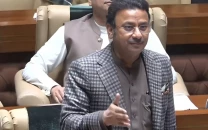Forget consumer rights, Sindh has failed to even make consumer courts operational
Sindh government has also not formed the consumer protection councils at the provincial and district levels

Over four years since the law was passed and a month after judges appointed, the courts are nowhere closer to hearing cases. PHOTO: FILE
Almost four years after enactment of the Sindh Consumer Protection Act, 2014, the judges were posted in the consumer courts by the Sindh High Court (SHC). A petition against non-implementation of the Act was filed in the SHC by Advocate Tariq Mansoor in 2017. In September, 2018, the provincial government sought at least eight to 10 more months from the SHC to set up the courts, offering to initially open these courts in six divisional headquarters. However, the SHC had rejected the plea and notified the appointments on January 12.
Jurisdiction
Under the law, complainants can take their claims to these courts against a very broad array of products and services. The products include electronics, household items, food, water, beverages, agriculture, automobiles and the parts, construction material, medical products and stationery, among other items. Besides, public utilities, banking, financial and insurance services, medical services, agricultural services, hotels, restaurants, marriage halls, cable TV, vehicle tracking, transport, airline and visa consultancy are among a long list of services that fall under that purview of these courts.
"The Sindh government has only sanctioned the budget for payment of salaries to the judicial officials and their staff. But the operational expenses and allocation of vehicles haven't been approved in the 2018-19 budget," an official of Bureau of Supply and Prices, a sub-wing of the Sindh Agriculture Department, told The Express Tribune. "The government is also yet to advertise vacancies for the appointment of staff."
The bureau will liaise with consumer courts in the proceedings. Its officials will act as inspectors and case officers. According to him, each district-based judge will be given seven staff persons including an assistant, a reader, a data processing assistant, a clerk, a bailiff, a messenger and a driver.
He disclosed that the department has still not received the notification about the lifting of ban on appointments on government jobs. The official said that as soon as they receive the notification, they will hold direct recruitment for grades one to five and through the National Testing Service (NTS) for higher grades.
Courtrooms
The SHC directed the district judiciary to 'temporarily' provide infrastructure and staff for the judges until the bureau arranged permanent offices with furniture and fixtures. However, this responsibility has reportedly been permanently transferred to the district judiciary. Javed Qaimkhani, director of the bureau of supply and prices, also confirmed this development to The Express Tribune.
The judicial officers, who spoke to The Express Tribune on condition of anonymity, are skeptical about the judges being able to get courtrooms in the district courts. "The court buildings in most cities are already saturated. It seems that the district judiciary will have to construct new courtrooms to adjust the consumer courts," said a judicial officer.
An official of the Bureau told The Express Tribune that they were directed to search office premises in six divisional headquarters of Sindh in 2017 for the courts. "We searched for offices to hire on rental basis and recommended the selected places to high-ups but the matter was dealt with procrastination," he revealed.
Working with the district judiciary, so far most of the judges have only been provided partial staff. "We don't have any cases to hear and we don't even know which government department should be engaged to conduct the investigation of a certain case," said a judicial officer. The officer said that they expect to be provided orientation training but they have still not been intimated about such a training program.
A senior official of the bureau, who also requested anonymity, claimed that the high-ups have asked them to buy as much time as possible before the courts can be activated.
Consumer Rights Day: Govt mulls consumer courts, council for capital
Assistant directors
According to the bureau, its district based assistant directors (AD) will liaise with the courts and conduct investigations. An official said that 17 ADs have been recently appointed through the Sindh Public Service Commission and after the new appointments, the bureau will be able to post an AD in each district of the province.
"The bureau will not hire lawyers. It will be represented by the ADs. Earlier we had proposed to the Sindh Government to make law graduation an eligibility criterion for appointment as AD in the bureau. But that recommendation was turned down," the official said.
The judicial officers also wondered how the ADs would cope with the court proceedings if they were not legal professionals. "If the complainant and the defender will be represented by their lawyers, how will a non-legal brain contend with them?"
Consumer protection councils
The provincial government is also apparently delaying formation of the councils at the provincial and district levels. The councils are supposed to comprise government officials as well as representatives of the trade, industry and consumers.
The councils, under the law, will be responsible for recommending reforms, creating awareness among consumers, provide information about products and services, coordinate with manufacturers, suppliers and consumers and remove defective products and services from the market. The councils will also register or de-register laboratories for testing of a product or equipment besides setting guidelines for the labs.
Judges posted in Sindh's consumer courts
The Sindh Consumer Protection Act, 2014, has largely been replicated from Punjab Consumer Protection Act, 2005. "It took Punjab almost a decade to make the consumer courts functional. In comparison, our [Sindh's] courts are toddlers," commented an official of the bureau.
Published in The Express Tribune, February 19th, 2019.



















COMMENTS
Comments are moderated and generally will be posted if they are on-topic and not abusive.
For more information, please see our Comments FAQ